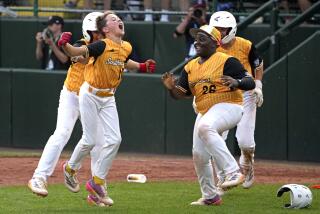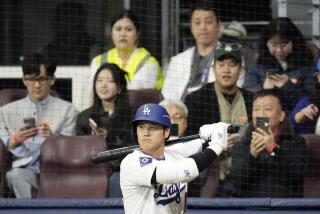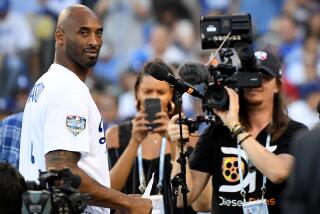Japan Is Classic Winner
- Share via
SAN DIEGO — At the end of nearly three weeks, contested over two continents and to the extreme of Commissioner Bud Selig’s imagination, the inaugural World Baseball Classic concluded Monday night in a Japanese victory, and with only two major leaguers on the field.
Japan defeated Cuba, 10-6, in front of 42,696 at Petco Park, then celebrated amid confetti and 16 national flags as though it was meaningful, and lasting.
On the field, as the Cubans applauded politely then greeted them with hugs and handshakes, the Japanese hoisted their venerable manager, Sadaharu Oh, into the air.
With 177 major leaguers having been eliminated from the WBC before them, the Japanese accepted their trophy and returned home to finish their own spring training.
The Cubans returned home to finish their season, as heroes, their victory in acquitting themselves so well against the world’s professionals, then in reaching the final.
Wearing its lucky red uniforms but cleats of several different colors, Cuba needed three pitchers and 30 minutes to get out of the top of the first inning, during which Japan batted nine and scored four runs.
Starter Ormani Romero faced four batters, then disgustedly handed the ball to Vicyhoandry Odelin, who faced only four himself.
Japan’s 4-0 lead grew to 6-1 behind starter Daisuke Matsuzaka, who gave up only a first-inning home run by Eduardo Paret in four innings.
Cuba scored twice in the sixth inning, in part because of the first of two errors by shortstop Munenori Kawasaki, then cut the deficit to 6-5 on Frederich Cepeda’s two-run homer in the eighth inning.
Former San Diego Padre reliever Akinori Otsuka entered after the home run -- to the theme of Trevor Hoffman’s “Hell’s Bells” -- and finished the game.
Japan scored four runs in the ninth, two on a pinch single by Kosuke Fukudome, whose pinch home run Saturday helped beat Korea. In the postgame clubhouse, Oh ceremoniously tipped his cap to his team, Ichiro Suzuki shouted, “You have to respect the old guy!”, meaning himself, and pitcher Koji Uehara formed his hair into a champagne Mohawk and led the team in a chant of “Ichiro!”
“I believe this whole event was a meaningful one,” Ichiro said. “This is probably the biggest moment of my baseball career.”
Cuba had 11 hits to Japan’s 10, one error to Japan’s three.
“We’re happy with the result, but we’re not satisfied because we made it all the way here,” Cuban left fielder Cepeda said. “We could have fought more and gotten the win, but that’s baseball. There will be another championship and we’ll keep moving forward.”
The WBC, by nearly all accounts, held its own amid initial criticism over the format and the timing, then the surprisingly poor play and second-round elimination of the Americans.
From the first pitch in Tokyo on March 3 to the last on another cool night in San Diego, nearly 740,000 people attended 39 games spread over seven venues.
The final, though it lacked the local appeal of U.S. major leaguers, found two countries of rooted baseball pedigrees.
That the Cuban players earn about $35 a month, less than half a major league per diem, and in their country play for teams at about American baseball’s double-A level, made them no less of a factor in the tournament.
That their regular season runs from November to May, in fact, made them more of one.
“We are competing as baseball men, not as professionals or amateurs,” Oh said before the game. “Baseball players are baseball players.”
It is a theme Selig could live with, as his inaugural tournament almost certainly survived to see another, in 2009.
The next three years will be spent pushing the tournament from March to July to November, gauging its best place on the calendar, though MLB officials appear wed to March.
And Cuba figures to be a factor in the next tournament. Noted one major league official as Cuba’s bus pulled away Monday, “Everybody got on the bus.”
More to Read
Go beyond the scoreboard
Get the latest on L.A.'s teams in the daily Sports Report newsletter.
You may occasionally receive promotional content from the Los Angeles Times.










